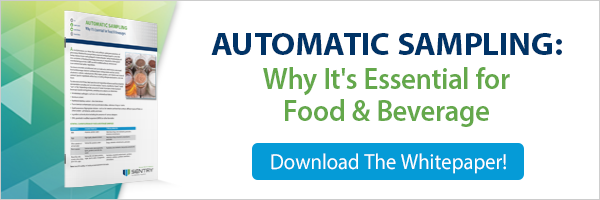
Flour millers must ensure they’re meeting minimal requirements from the U.S. Food & Drug Association (FDA) for milled grains and flours. If a producer doesn’t meet these federal requirements, they can be vulnerable to civil sanctions, seizure of product, or even criminal penalties. Automatic sampling can protect millers from lengthy downtime and high operating costs, without interfering with production and overhead costs.
Quality risks at Every Process Stage
Flour milling requires multiple grinding and separating procedures to create a consistent, high-quality product. As the grain moves through each of these stages, there’s the risk of contaminants entering the process.
- Grade. After the wheat is received at the flour mill and inspected, the grain is graded based on several factors, the most important of which is the protein content.
- Purify. The wheat is then cleaned to remove all foreign matter, such as sticks, rocks and insects.
- Prepare for grinding. The purified wheat is washed in warm water and spun dry in a centrifuge. The moisture content must now be controlled so the outer layer of bran can be efficiently removed during grinding. This usually involves “conditioning,” or soaking the wheat in water or steam at various temperatures and pressures before removing excess water with vacuum dryers. Proper drying is essential to reduce the risk of introducing salmonella and listeria to the flour.
- Grind. The wheat is ground between large metal rollers with spiral grooves that crack the grains and separate the interior of the grain from the outer layer of bran. The resulting product passes through metal sieves to isolate it into flours of different fineness, in particle sizes that range from 1µ to 200µ.
- Process. Small amounts of bleaching agents and oxidizing agents are added to the flour, and leavening agents and salt are added if producing self-rising flour. As required by law, vitamins and minerals are also added, including iron, thiamin, riboflavin and niacin. The flour is then packed for distribution. However, long-term bulk storage facilities can introduce unwanted moisture – and pathogens – if it’s not stored correctly.
Protect Your Processes with Automatic Sampling
Representative grain and flour sampling helps ensure your milling operation is adhering to the latest regulations and standards and producers’ requirements – to ensure product quality and consumer safety.
Automatic sampling can be used to test for:
- Protein content – hard wheat contains 11-18% protein and soft wheat contains 8-11%
- Ash content – the portion that remains after burning and consists of various minerals
- Foreign matter – sticks, rocks, etc.
- Vitamins and minerals – to ensure compliance with government standards
- Additives – to measure the exact amount and ensure accurate labeling
In the past, sampling grain and finished products in the milling process have been largely dependent on manual or direct sampling, such as hand scoop and spigot sampling. These methods rely on an operator directly accessing material and physically taking the sample from the lot. But they’re generally considered inadequate because they can introduce sampling bias, variations due to human error and sample contamination, and expose the operator to process or environmental hazards.
Automatic sampling systems safely, effectively and accurately collect samples and help reduce sampling bias. They can be installed in one or more locations within a production line to sample at every step of the milling process so producers can identify and rectify issues before the product is milled and packaged. These sampling systems also can increase confidence in laboratory data and improve your ability to assess and mitigate risks in the process. They can be easily adapted to meet QA/QC processes and testing needs within current production processes.
Sentry Equipment offers automatic food and beverage sampling solutions that can help producers sample at every stage of the production process, ensuring your milled products – and bottom line – remain safe.
Contact us at +1-262-567-7256, or complete our online contact form for more information.



